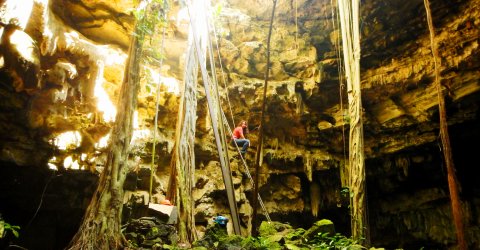
“I just want to help from the ground”: A Mayan woman's action to help protect the Cenotes
Born and raised in Yucatan, Mexico, I have been fascinated by the complexities of the world. This has drawn me to an extreme curiosity and feeling of awe for nature. I have directed my efforts to caring about what surrounds me: water. Through science, as an academic woman, I learned that freshwater, particularly groundwater, represents an important life-sustaining resource: it feeds springs and streams and supports wetlands. As an indigenous person I learned from my ancestors that our relationships with water and nature are also important.
In Yucatan no surface waters or rivers exist: instead there are groundwater caves, locally called cenotes (from the Mayan word ts’onot, sinkhole). Cenotes are the home of important species such as the Blind Fish (Ogilbia pearsei) and the Blind Swamp Eel (Ophisternon infernale), and they represent the main source of freshwater for human communities. Some environmental problems (such as wetland degradation, pollution and biodiversity loss) particularly affect the Ring of Cenote wetlands – an important groundwater system created by a meteorite impact 65 million years ago. Helping communities to solve these problems made me re-evaluate what I wanted to do, and so I developed my passion for groundwater.
As a young girl growing up in a Mayan community, I understood the importance of caring for our natural resources, and this innate consciousness continues to fuel my current work. Based now in Germany, where I am studying for a PhD, I am working towards solutions by combining natural and social sciences with traditional ecological knowledge which respects Mayan wisdom.
I am strongly motivated to help by changing top-down management to a more bottom-up approach, through carefully planned and trans-disciplinary local projects. My goal is to protect the cenotes ecosystem as a vital wetland for Yucatan’s groundwater-dependent society. By developing actions with different stakeholder groups (policy-makers, NGOs and local communities), working on environmental activities with the young, for example through Cenote clean-ups and underwater exploration, and through cooperation, I am demonstrating that it is possible to work together for a better ecosystem.
By Yolanda Lopez, PhD candidate, Ludwig-Maximilians Universität München, Germany